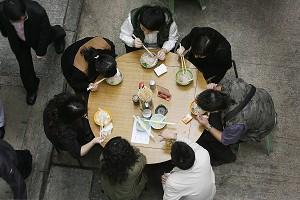Chinese Deputy Director of the Central Compilation and Translation Bureau, Yu Keping, stated political reform should target an adjustment of the social benefit distribution pattern. This would be done through guiding change and maintaining a “dynamic stability” instead of currently blocking change and maintaining a “static stability.” Experts criticize his claim is in fact a step backwards.
Yu, once earned popularity with his article entitled, “Democracy is a Good Thing.” He stated on Dec. 12 during the Caijing Magazine Annual Conference in Beijing, that Chinese political reform should proceed with dynamic stability instead of the current static stability to benefit the majority of workers and farmers.
Yu emphasized 14 prominent administrative issues such as public interest manipulated by certain government departments; the decision-making process is not scientific and democratic; inappropriate, vacant, and inefficient management; lack of effective supervision of administrative power; and insufficient scientific consideration in establishing departments.
His list continues with: the administration does not follow the law; officials do not carry out their duties; government focuses on controlling instead of providing service; there is a lack of cooperation between officials and the public; a high administration cost, a low management transparency; lack of integrity between local and central governments; serious corruption; and an ambiguous power, and responsibility definition between central and local governments, Party committees, and government authorities and their limits.
Hu Ping, editor-in-chief of Beijing Spring magazine, commented Yu’s proposal is going backwards.
Hu says, “I think his talk is worse than his ‘democracy is a good thing.’ When discussing these issues, there are terms and concepts with clear and accurate definitions. Instead, he was being political with vague and ambiguous words to leave room for the authorities to interpret freely.”
Fang Jue, a former Chinese official, now a U.S. resident, believes Yu’s problem-solving strategy isn’t even comparable to what was proposed at the 13th Party Congress 20 years ago.
Fang adds, “Chinese government scholars have falsely created many terms to avoid political reforms. The specific content of ‘dynamic stability’ as a reform strategy remains the same as 20 years ago, prior to the 13th Congress hosted by Zhao Ziyang in 1987.”
Fang indicates “dynamic stability” is in fact just the alternative of so-called “progressive reform,” which was argued by others as cutting off a dog’s tail little by little with prolonged pain. He believes Yu was targeting reform of administrative bodies and evidently, the results would not turn out to be so good.
Fang argues, “Mr. Yu mentions nothing about the most fundamental concept of democratic reform, but empty talk about organizational reform and administrative reform which were mentioned 20 years ago, and have proved to be false through 20 years of practice. This type of reform has been practiced with no success. Chinese political reform must not take little and gradual steps in organization and administration as suggested by Mr. Yu. It has to start from fundamental issues. Chinese democratic reform must begin.”
Hu does not believe creating new terms such as “static stability” will provide help to any practical problems, given the fact that there are direct and understandable explanations to political issues. In fact, Yu’s method has avoided the real problems in China.
Hu stated, “The inequality in China was not caused by the market or history, but by power. The rich who plundered the wealth created by the poor, largely cause the poverty the poor now suffer in China. The rich to a large extent use power to plunder the wealth of others. The problem cannot be solved by asking the rich to provide subsidies to the poor. Yu’s words completely cover up a well-known problem.”
According to Hu, democratic reform is not complicated. There are examples that can be learned from many democratic countries in the world. The Chinese Communist’s nature to maintain its own special power and socio-economic benefit has led to its many kinds of excuses and arguments. Consequently, various contradictions continue to accumulate and social stability has failed to be maintained.



